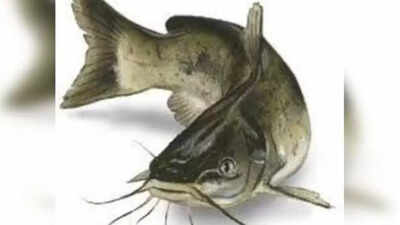In regions where fish is a dietary cornerstone, particularly when paired with rice, making informed choices about the fish we consume is critical. While many fish varieties are safe and nutritious, the Thai Mangur fish (also known as Thai Catfish) is a concerning exception.

Despite a government ban that has been in effect since 2000, this fish continues to be illegally farmed and sold in numerous regions across India, posing a significant risk to public health. The ban is due to the fish's substantial health risks and its detrimental impact on the environment, including a 70% reduction in native fish populations and severe damage to India's aquatic ecosystems.
The Thai Mangur is a hybrid catfish variety, initially cultivated for its rapid growth and adaptability. It is an invasive species brought in from outside India. As a carnivorous species, it poses a threat to native fish, thereby significantly affecting aquatic habitats. While its rapid growth and ease of farming led to initial popularity, the Thai Mangur quickly became a major concern for both public health and ecological balance. Consequently, its farming, sale, and consumption are now legally prohibited in India.
According to News 18, the Indian government and various regulatory bodies have banned Thai Mangur due to its detrimental health effects and environmental dangers.
The National Green Tribunal (NGT) imposed a ban on its cultivation as far back as 2000, highlighting the fish's carnivorous nature and its potential to disrupt aquatic ecosystems. As a leading voice in fisheries health and safety, authorities emphasize that cultivating, selling, or consuming Thai Mangur fish is not only illegal but also extremely dangerous to human health. Violators of this ban may face stringent legal actions under national laws.
Dr. Priyanka Arya, Assistant Director of the Aligarh Fisheries Department, warns that consuming Thai Mangur fish can increase the risk of cancer. This is because the fish is often raised in unsanitary conditions and fed with rotten meat mixed with spinach, a practice that leads to serious water pollution and poses a direct threat to consumers. The fish has been linked to carcinogenic effects, making it one of the most harmful fish banned in India.
Beyond the immediate health risks, the Thai Mangur fish has inflicted substantial damage on India's aquatic ecosystems. Research indicates that this invasive species is responsible for a 70% decrease in native fish populations in India. Its aggressive, carnivorous feeding habits allow it to prey on smaller native fish, thereby disrupting the ecological equilibrium in rivers, lakes, and ponds. Furthermore, Thai Mangur often carries parasites such as fish lice, which can trigger epizootic outbreaks, leading to widespread disease and the potential decimation of entire fish populations.
One of the primary reasons Thai Mangur is considered dangerous is due to unsustainable and unhygienic farming practices. To maximize profits, some fish farmers feed these fish with rotting meat waste, often combined with leftover vegetables like spinach. This practice not only contaminates the fish but also pollutes the surrounding water bodies, accelerating the destruction of aquatic ecosystems.
The ban on Thai Mangur is actively enforced. The government has stated that anyone involved in the cultivation, distribution, or consumption of Thai Mangur will face legal penalties. Government agencies, including the Fisheries Department, have been instructed to conduct raids and take appropriate legal action against offenders. The Fisheries Department has also launched multiple awareness campaigns to educate the public about the dangers of consuming Thai Mangur, emphasizing its carcinogenic properties and the harmful practices associated with its rearing.
Newer articles
Older articles
 5 Overlooked Warning Signs of Colon Cancer: Early Detection Saves Lives
5 Overlooked Warning Signs of Colon Cancer: Early Detection Saves Lives
 Shukla's ISS Arrival Heralds New Era for Indian Space Exploration; Gaganyaan Mission Looms
Shukla's ISS Arrival Heralds New Era for Indian Space Exploration; Gaganyaan Mission Looms
 Vijay Sethupathi Apologizes Amid Controversy Over Son Surya's Film 'Phoenix'; Thalapathy Vijay's Support Revealed
Vijay Sethupathi Apologizes Amid Controversy Over Son Surya's Film 'Phoenix'; Thalapathy Vijay's Support Revealed
 Android Security Alert: Government Warns of Critical Flaws Exposing User Data
Android Security Alert: Government Warns of Critical Flaws Exposing User Data
 Ashada Gupt Navratri 2025: Dates, Significance, and How to Observe This Hidden Festival
Ashada Gupt Navratri 2025: Dates, Significance, and How to Observe This Hidden Festival
 Skin Deep: 7 Warning Signs on Your Skin That Could Signal Heart Trouble
Skin Deep: 7 Warning Signs on Your Skin That Could Signal Heart Trouble
 Smith Eyes Grenada Test Return After Injury Layoff
Smith Eyes Grenada Test Return After Injury Layoff
 Staying Hydrated May Significantly Lower Risk of Heart Failure, New Study Suggests
Staying Hydrated May Significantly Lower Risk of Heart Failure, New Study Suggests
 Moto G54 Price Slashed in India: Check Out the New, Lowered Costs
Moto G54 Price Slashed in India: Check Out the New, Lowered Costs
 Gambhir Sidelines Pant's Twin Tons After India's Test Loss, Emphasizes Team Performance
Gambhir Sidelines Pant's Twin Tons After India's Test Loss, Emphasizes Team Performance